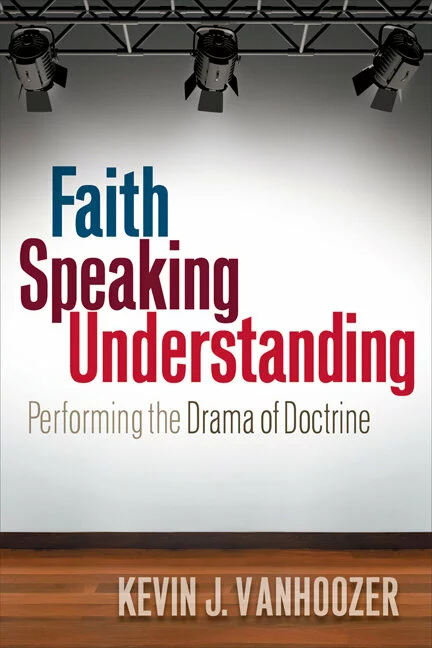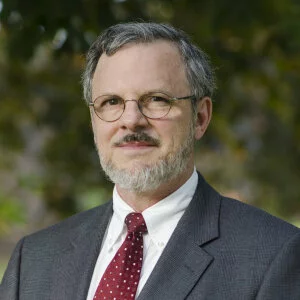Recognizing the uniqueness of the dramatic metaphor for addressing doctrine and church practice he makes a case for the fitness of dramatic concepts for capturing what should be the dynamic relationship between doctrine and practice in the church. Most importantly, theatrical language draws out what is often lacking in doctrinal education: the necessity of living out the faith, of “performing” what we believe. Church and humanity are caught up in a drama in which the Divine Dramatist invites audience participation. Fitting participation involves faithfully enacting “what is in Christ,” a key phrase throughout the book.
Stephen Jenks
Director, The Examen(ed) Church, Marquette University
Themelios 40, no 2 (2015): 347-348.
Faith Speaking Understanding is a fascinating combination of Reformed theology, Balthasarian theodramatics and insights from performance and speech-act
theory. It makes for a deeply inspiring vision of Christian theology, never separated from the actual living out of ecclesial life in Christ. Vanhoozer sees the
theologian in the role of a pastor-teacher, committed to communicating the gospel to the local church and beyond. Theology is not simply a body of knowledge, but a guide and accompaniment to our living in Christ. The gospel of Jesus Christ, and Jesus’ revelation of the eternal trinitarian communion to which we are called in the Holy Spirit, stand at the dramatic center of this theological vision. All theologians - Protestant, Catholic and Orthodox - have much to learn from this theodramatic account of the location and task of teaching Christian doctrine.
Matthew Levering
James N. Jr. and Mary D. Perry Chair of Theology, Mundelein Seminary
International Journal of Systematic Theology 19, no 2 (2017): 230-233.
Faith Speaking Understanding has multiple strengths. Foremost, Vanhoozer has done a remarkable job addressing the unfortunate disconnect between spirituality and Christian doctrine in the contemporary American church. He rightly notes that doctrine and spirituality cannot be separated. Many have found doctrine to be mundane, tedious, and boring. Vanhoozer has provided an accessible model for doing doctrine that has the potential to reinvigorate believers concerning the role of doctrine in the church. He strategically uses elements of speech-act theory to help explain how one does something when she speaks. An example of this is the self-involving nature of confessions and creeds. Doctrine is a form of dispositional belief that necessitates self-involving speech acts.
Overall, Vanhoozer has provided a helpful model for doing doctrine in the contemporary church. Though those not well acquainted with the theatre and its terminology may not see the book’s argument as overly enlightening, it can still serve as a helpful tool for understanding the task of doctrine. This book would serve well the student of theology as well as the curious layperson who is interested in the role of doctrine in the church.
Andrew Hollingsworth
Assistant Professor of Theology and Christian Philosophy, Brewton-Parker College
Journal for Baptist Theology & Ministry 12, no 2 (2015): 61-63.
Serious Christians who love God and who love the world God “so loved” will find Faith Speaking Understanding good to read and more than satisfying to reread... On Sundays, the church gathers for worship. And as the late Robert Webber proclaimed, “worship is a verb” and “worship does God’s story” (Worship is a Verb [Waco, TX: Word, 1985] and Ancient-Future Worship [Grand Rapids: Baker, 2008], respectively). Monday through Saturday, the church disperses to pursue its vocation of discipleship. In Faith Speaking Understanding, Vanhoozer effectively proclaims (to improvise on Webber’s trope) that “discipleship” is a verb and that “discipleship does God’s story.” Discipleship performs the drama of doctrine.
Sue A. Rozeboom
Professor of Liturgical Theology, Western Theological Seminary
Interpretation 70, no 4 (2016): 502-503.
Readers of Drama of Doctrine will likely find Faith Speaking Understanding more accessible and practical in its application. Those who have not read the former work will he well served by starting here. And anyone who desires to see doctrine not simply believed but practiced will find this work helpful. Theology is not simply faith seeking understanding, it is faith lived out, faith“speaking” uderstanding. “Speaking,” in Vanhoozer’s metaphor, is more than simply words; it is words in action. As an aid to help followers of Jesus Christ become more like him in word and deed, this book is highly recommended.
Glenn R. Kreider
Professor of Theological Studies, Dallas Theological Seminary
Bibliotheca Sacra 172, no 687 (2015): 372-373.
This book is tremendously insightful and will prove exceedingly useful for church leaders. It provides not only a coherent vision of theology, but also a compelling vision of the church and her mission. It is especially important for those who teach in the church to understand the church's role in redemptive history, and to communicate that effectively to the congregation. It is also important for church leaders to recognize the necessity of doctrine when it comes to making disciples. Vanhoozer demonstrates that this is vital. The church simply will not know what it ought to be doing and saying if doctrine is not at the center of the church's life. The model provided here should prove effective in communicating the church's identity and tasks. Students of theology will also benefit from this work. Some might find this fresh articulation more accessible than his larger work, The Drama of Doctrine. Divinity students may also find it more relevant to being a theologically-informed pastor. Readers will learn a lot of theology along the way, even if one finds the theatrical model difficult to comprehend or apply. Vanhoozer is a seasoned, intelligent, and influential master-theologian. His works exhibit a richness of study and experience that are obvious, even if often dense and sophisticated (in the best sense of the word). I cannot but recommend the text to all serious pastors and teachers of divinity, even for those who might not embrace the theatrical model as a controlling framework.
Jonathan Huggins
Chaplain, Berry College
Christian Scholar's Review 45, no 1 (2015): 91-93.
Vanhoozer’s deep affection for the thought of the church is infectious and refreshing in an age that values a host of other things more than good thinking. A
major strength of his book is its strong affirmation of the importance of church as more than a mere set of practices, with a concomitant downplay of the importance of beliefs and ideas. Some present Christianity as a culture in which convictions are not as significant as habits and general worldview. But Vanhoozer shows that one of the joys of the Christian faith is that we don’t have to make it up as we go; the saints can help us think our way toward discipleship as God means it to be. And what we think about God is decisive. We’ll never pull ourselves out of the morass of subjectivity and expressive individualism without some help from those who thought about the faith more deeply than we’re thinking now.
At the same time, Vanhoozer demonstrates that Christian thinking is a considerably more engaging, embodied affair than much that passes for thinking these
days. Christians challenge the world’s ways of thought by doing what we know, by displaying lives and local churches that show the world something more than the world can produce by its philosophies, schemes, and political programs. The truth that is Jesus Christ is meant to be not only intellectually affirmed but also lived. As Augustine said in On Christian Doctrine, faithful scriptural interpretation does two things: it discovers what we need to learn, then “presents what we have learnt.”
William H. Willimon
Former Professor of the Practice of Christian Ministry, Duke Divinity School
The Christian Century 132, no 2 (2015): 37-38.
For readers familiar with The Drama of Doctrine, one important revision by Vanhoozer is the shift away from identifying Scripture as a "script” to that of a “franscript” (pp. 23-24). Since not all Scripture is "law,” per se, Vanhoozer now prefers the image of "franscript,” whereby the Bible is ،،a divinely authorized record of God’s word and acts in the histories of Israel, Jesus Christ, and the early church” (p. 63). Moreover, the idea of "franscript” is better able to do justice to the diverse communicative forms and practices of Scripture as the authoritative Word of God.
This work is meant to be read by pastors and theologians alike, but ultimately, the church is in its sights. Faith Speaking Understanding is a proposal for making disciples in the local church. Perhaps where the academy meets the church in this freatise occurs in Vanhoozer’s claim that a disciple missing doctrine is "without fom and void.” Still, I fear that Vanhoozer may once again receive requests from his readers due to the book’s length and density. Nevertheless, Faith Speaking Understanding at its core is about following and participating in Jesus Christ, and for that reason pastors, theologians, or disciples in general will find this volume a tremendous resource for fillfilling the mission of the church to “make disciples” of all nations—disciples who know, believe, and act out before the world “what is in Christ.”
William M. Marsh
Associate Professor of Theology, Cedarville University
Criswell Theological Review 13, no 2 (2016): 149-152.


